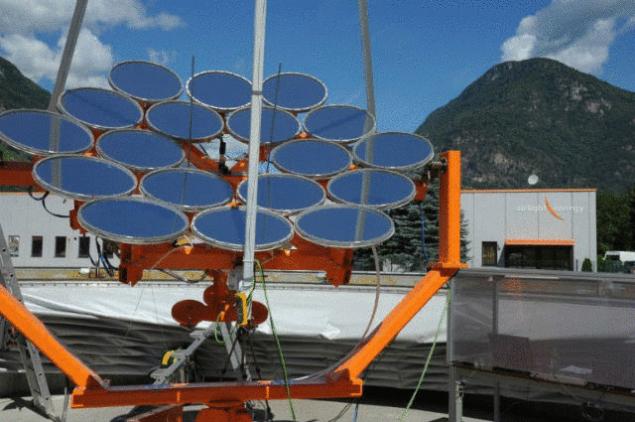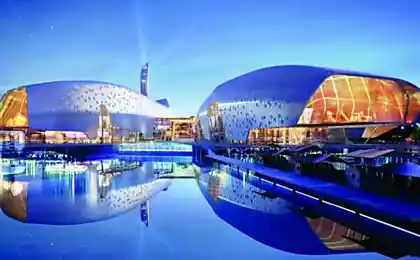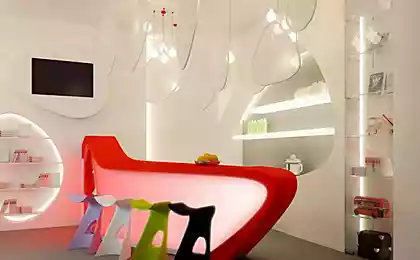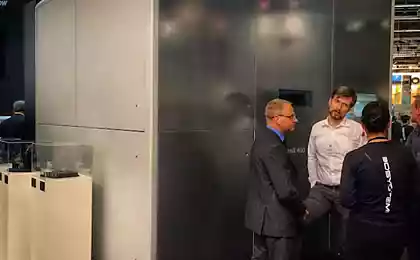360
Project two giants will help cities with electricity
On the basis of developments IBM system direct water cooling technology and water absorption, as well as receivers of solar radiation, the engineers of the companies have created an innovative universal system HCPVT.
According to Vesti, each design is a parabolic antenna with an area of 40 square meters that is covered with 36 elliptic mirrors made of plastic film with a thickness of only 0.2 millimeter. The HCPVT system concentrates the solar radiation on the number of receivers with liquid cooling, each of which contains an array of chips by the area in square centimeter. Each chip is able to generate up to 57 watts of electricity when operating within one solar day. Together they produce up to 2 kW of electricity and 20 kW of heat.

The cooling system consists of microstructured tubes that conduct the purified water around the receivers. Thus, the excess heat is removed is 10 times more effective than using standard techniques. The water is heated to about 85-90°C, but the heat from the chips keeps them at a relatively low, workable temperatures. Without this cooling, the concentrated energy of the sun brought the temperature of the chips up to 1500°C.
"The direct cooling technology with very small pumping power used to cool the photovoltaic chips. By creating this system, we were inspired by the branched blood supply in the human body," says the study's lead author Bruno Michel (Bruno Michel) from IBM Research.
The HCPVT system can also be configured so that it provided people with drinking and hot water, and also engaged in the cooling air.
"We use waste energy for distillation and air conditioning, get 25% return on solar power and 80% efficiency. While our design has the ability to track the movement of the sun to turn to him at just the right angle," says the study's lead author Bruno Michel.
The first commercial model HCPVT will be delivered to the market in approximately two to three years, as desalination systems, distillation and cooling require slight modifications.
Source: greenevolution.ru
According to Vesti, each design is a parabolic antenna with an area of 40 square meters that is covered with 36 elliptic mirrors made of plastic film with a thickness of only 0.2 millimeter. The HCPVT system concentrates the solar radiation on the number of receivers with liquid cooling, each of which contains an array of chips by the area in square centimeter. Each chip is able to generate up to 57 watts of electricity when operating within one solar day. Together they produce up to 2 kW of electricity and 20 kW of heat.

The cooling system consists of microstructured tubes that conduct the purified water around the receivers. Thus, the excess heat is removed is 10 times more effective than using standard techniques. The water is heated to about 85-90°C, but the heat from the chips keeps them at a relatively low, workable temperatures. Without this cooling, the concentrated energy of the sun brought the temperature of the chips up to 1500°C.
"The direct cooling technology with very small pumping power used to cool the photovoltaic chips. By creating this system, we were inspired by the branched blood supply in the human body," says the study's lead author Bruno Michel (Bruno Michel) from IBM Research.
The HCPVT system can also be configured so that it provided people with drinking and hot water, and also engaged in the cooling air.
"We use waste energy for distillation and air conditioning, get 25% return on solar power and 80% efficiency. While our design has the ability to track the movement of the sun to turn to him at just the right angle," says the study's lead author Bruno Michel.
The first commercial model HCPVT will be delivered to the market in approximately two to three years, as desalination systems, distillation and cooling require slight modifications.
Source: greenevolution.ru























